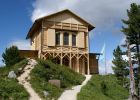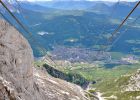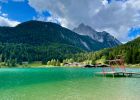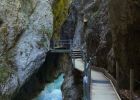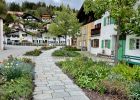Großer Ahornboden
The Großer Ahornboden is located at the head of the Rißtal valley in the Enger Tal, just before the village of Eng, at an altitude of 1080 to 1300 meters in the municipality of Vomp in the district of Schwaz, Tyrol. This area was already settled by humans around 4500 BC. In 1927, the “Ahornbäume bei der Alpe Eng am großen Ahornboden” were declared a natural monument, making it one of the oldest protected natural monuments in Tyrol. On December 20, 1988, the Großer Ahornboden was designated a protected landscape area, which covers 267.28 hectares and is part of the Karwendel Nature Park.
Origin and meaning
The formation of the Grosser Ahornboden is a combination of natural conditions and traditional human use. During the last ice age, the area was formed into a classic U-shaped valley by the “glacial plane” and later filled with gravel by the Enger Grundbach stream. The sycamore maple was able to develop optimally here due to its special root system. Alpine farming, which has been practiced since the 12th century, has also contributed to the development of the maple population by removing conifers and bushes.
Special natural features
The Grosser Ahornboden is not only a unique landscape due to the many sycamores, but also an important habitat for numerous species of mosses, lichens and ferns. A scientific study has identified 215 species of mosses and lichens, including the Rudolph's trumpet moss (Tayloria rudolphiana), which is protected throughout Europe. The old trees also provide habitats for cavity-nesting birds such as woodpeckers and bats.
Nature conservation measures
As the mountain maples live to be around 500 years old and many trees in the Great Maple Bottom have reached their age limit, dead trees are replaced by new plantings. These measures are necessary as natural regeneration no longer functions sufficiently due to changes in soil and water conditions as well as grazing.
Accessibility
The Großer Ahornboden can be reached from May to October via a toll road from Hinterriß. It is also possible to get there by public transport, for example with the “Bergsteigerbus Eng”. The toll road is closed from November to the end of April.
Kleiner Ahornboden
The Kleine Ahornboden is located at the southern end of the Johannestal at an altitude of around 1400 meters, directly below the steeply sloping north faces of the Hinterautal-Vomper chain. This place is also part of the Karwendel nature reserve in the Karwendel Alpine Park.
Accessibility
The Kleine Ahornboden can be reached on foot in around 2.5 hours from Hinterriß and in around 2 hours from the Karwendelhaus. By mountain bike, this time is reduced to around 1:15 hours.
Place of interest
On the northern edge of the Kleiner Ahornboden is a monument to Hermann von Barth, the “developer of the Karwendel”, who made a significant contribution to the exploration and popularization of the Karwendel mountains.
Conclusion
Both the Großer and Kleiner Ahornboden offer unique natural experiences and are important landscapes in the Karwendel Nature Park. They combine natural beauty with historical significance and are attractive destinations for nature lovers as well as hikers and mountain bikers. The impressive flora and fauna as well as the historical sites make these areas special highlights in the Alps.





